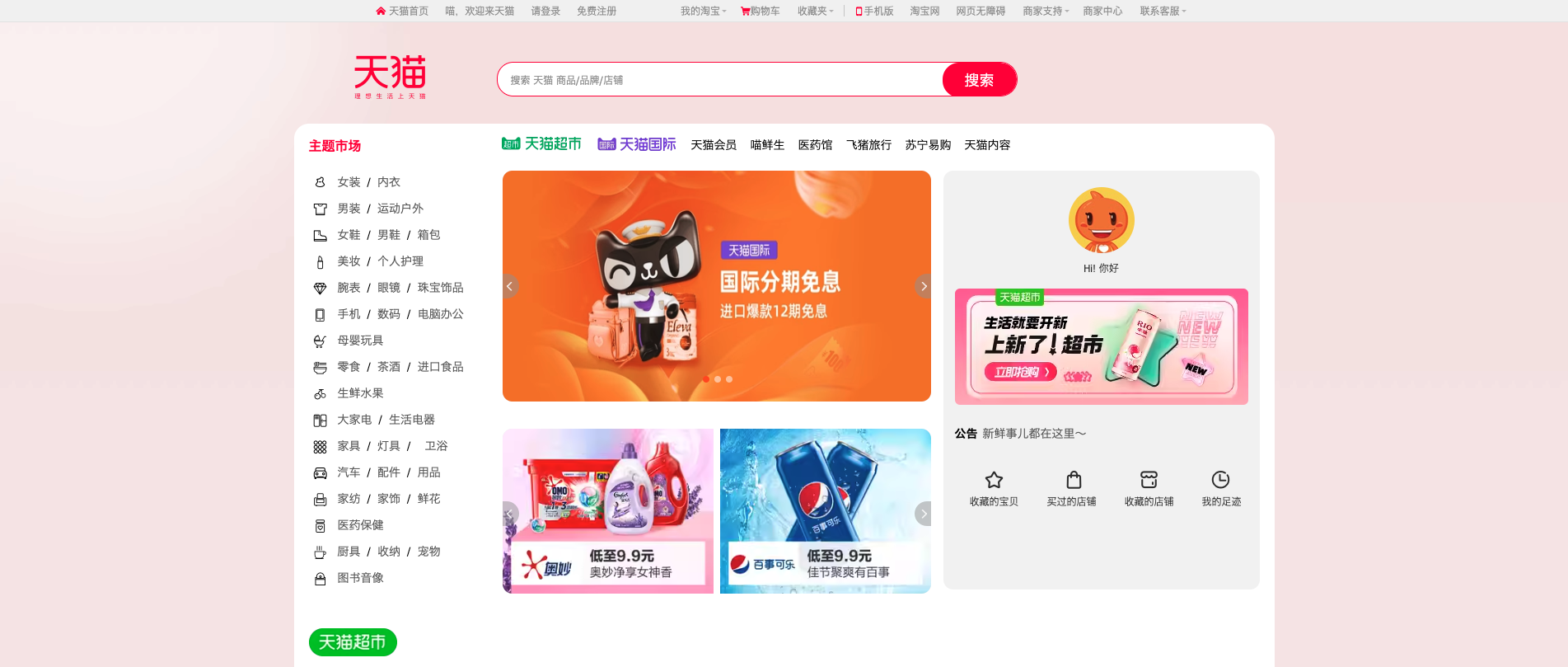Tmall (天猫), a dominant player in the booming China e-commerce, is a premium online marketplace established in 2008 by Alibaba Group. Unlike its sister platform Taobao (淘宝), which leans towards individual sellers, Tmall focuses on established brands and authorized retailers, offering a more curated and trustworthy shopping experience for Chinese consumers. By 2023, Tmall’s net sales totaled USD 24 billion and is expected to reach USD 25.4 billion in 2024.
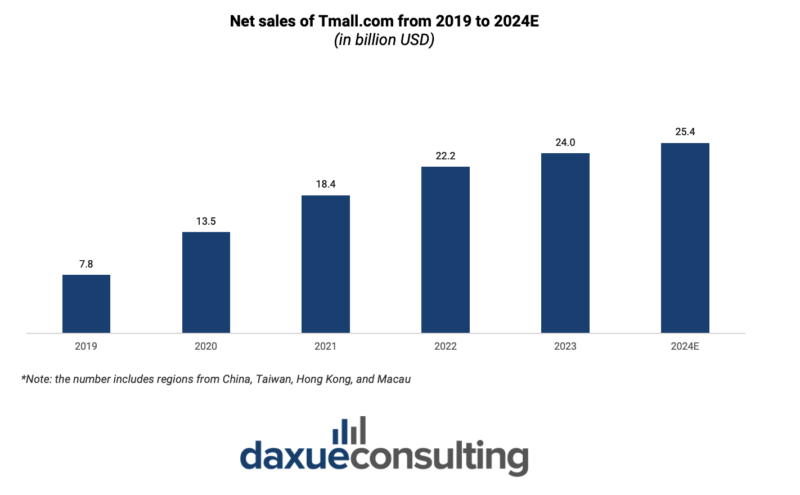
Data source: Statista, designed by Daxue Consulting, Net sales of Tmall.com from 2019 to 2024E
What is a Tmall Store?
A Tmall store is a virtual storefront on the Tmall platform, allowing brands and authorized retailers to sell their products directly to Chinese consumers. There are three primary options for establishing a Tmall store:
- Flagship Store: Owned and operated directly by a brand, offering the highest level of control and brand authenticity.
- Authorized Store: Established by a licensed retailer authorized to sell a specific brand’s products.
- Specialized store: Designed for businesses that own a brand or are authorized to sell the brand’s products. These stores can sell a maximum of two brands.
The Flagship Store is arguably the most popular of the three primary options for the Tmall store. This is because Flagship Stores are owned and operated directly by the brand itself, offering the highest level of control and brand authenticity. This is important to many consumers on Tmall, who are generally brand-conscious and seek quality products.
Taobao, Tmall, and Tmall Global: The comparisons
Taobao is another famous name in the Chinese e-commerce platform landscape. However, Taobao and Tmall should not be confused. Established in 2003, Taobao Mall acts as a bustling online marketplace, open to anyone from individual sellers to small businesses. This translates to a vast product variety, from handcrafted trinkets to discounted electronics. In contrast, Tmall offers a more curated experience. Here, only verified businesses like established brands and authorized retailers can set up shop.
In a nutshell, Taobao is like a flea market – vast variety, potential for hidden gems, but quality can vary while Tmall is like a high-end shopping mall – reputable brands, guaranteed quality, but potentially less price flexibility.
There is also Tmall Global (天猫国际). Tmall Global is a dedicated cross-border eCommerce platform within the Tmall ecosystem designed for international brands and foreign merchants to sell their products to Chinese consumers through a cross-border e-commerce model, offering bonded warehouses to its merchants.
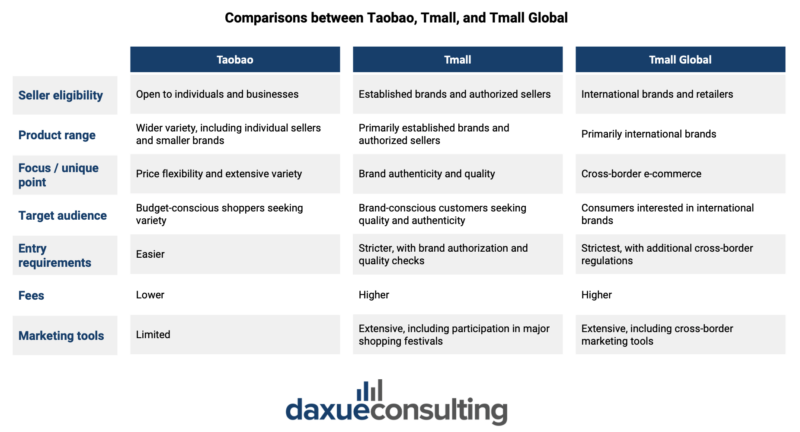
Table source: designed by Daxue Consulting, comparisons between Taobao, Tmall, and Tmall Global
Tmall Flagship Store 2.0: The key features
In 2019, ahead of the 2019 11.11 Global Shopping Festival, Tmall launched its Flagship Store 2.0. Tmall’s Flagship Store 2.0 represents a significant leap forward in offering personalized and immersive shopping experiences. This upgrade leverages the latest in digital technology—5G, big data, AI, and AR—to create an engaging and customized environment for consumers. Here is how it transforms the e-commerce landscape and some of its key features:
- Online-Offline Integration: Flagship stores display nearby store locations and their product availability. Customers can purchase online for in-store pickup or reserve items online for an in-store trial.
- Personalization: It tailors the shopping experience to individual preferences, displaying likely purchases and the best deals on the main page using algorithms.
- Engagement and Loyalty: Introduces a points system for activities within the store, by engaging with the brand (reviews, games, browsing), consumers can earn points for exclusive benefits within the brand’s Fan Club section.
- Tmall mini-stores: Think of them like WeChat mini apps within Tmall, where brands can create personalized experiences with content, customer service, and shopping all in one dedicated channel.
- Store lofts: customizable sections within a flagship store, like pop-ups with rich content and interactive features, similar to Wechat H5 mini-sites.
- Technological Enhancements: Incorporates AR, 3D, and AI for unique experiences like virtual makeup trials, enriching the online shopping experience.
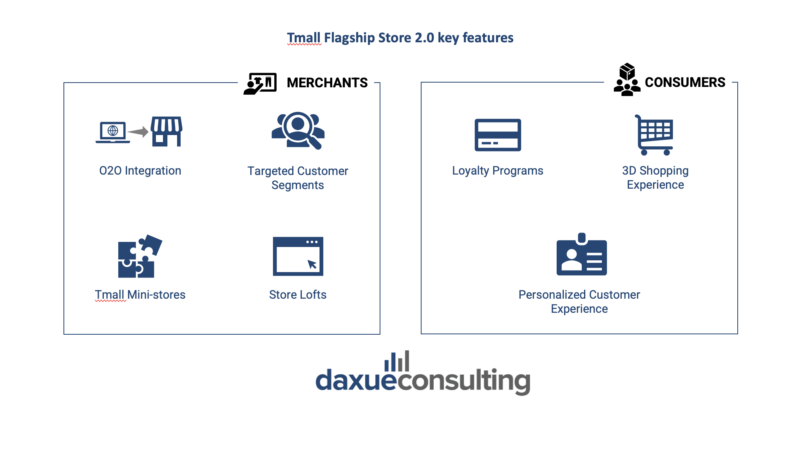
Infographic source: designed by Daxue Consulting, Tmall 2.0 key features
High-end cosmetics and luxury brands find particular value in the capabilities of Flagship Stores 2.0. The platform enables these brands to engage a young, affluent Chinese consumer base, offering rich content and immersive experiences that leverage brand image and reputation as key differentiators.
Consumer insights and behaviour
Demographics of Tmall users: Who shops on Tmall?
During 2023, Tmall reported having 877 million users engaging with their platform each month, with 380 million actively interacting with the site daily. A significant portion of this user base comprises women, who frequently use Tmall to discover and purchase international products and clothing, especially in personal care and fashion. This trend has positioned Tmall Global as an attractive platform for international brands looking to enter the market.
When it comes to Tmall Global, it attracts a predominantly young female user base, with two-thirds born after 1990 and women making up 70% of its customers. Geographically, they mostly come from China’s first to third-tier cities, showcasing a wide urban reach. Financially, 80% of Tmall Global’s shoppers are part of Alibaba’s 88VIP club, indicating a high spending power and loyalty to the platform.
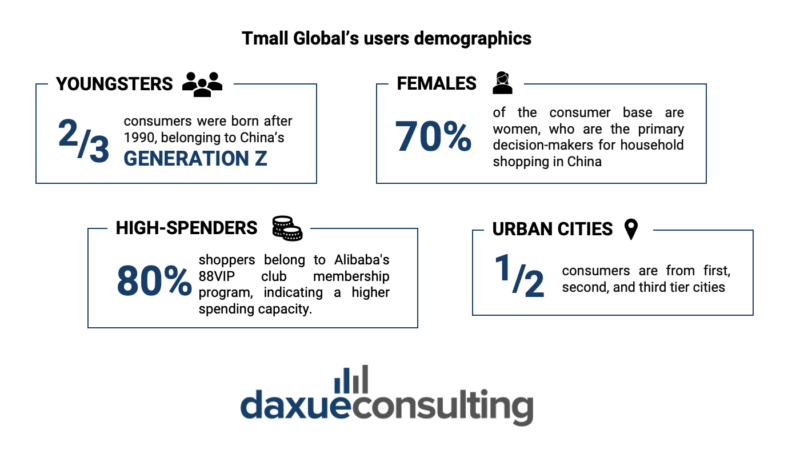
Infographic source: Alizila, designed by Daxue Consulting, Tmall Global’s users demographics
Consumer behaviour trends on Tmall: What do they buy, and why?
Tmall is recognized as a trusted platform for Chinese consumers seeking high-quality goods from established brands. This stems in part from their focus on established brands with a strong reputation for excellence. Chinese consumers value these brands’ proven track record, and Tmall’s strict application process further bolsters this trust. By guaranteeing authenticity and weeding out counterfeit products, Tmall significantly reduces the risk of consumers receiving subpar goods. As a result, Chinese consumers have a lower level of suspicion when shopping on Tmall, confident that they’re getting genuine products from reputable brands.
While value-conscious, Tmall users are willing to pay for quality and often prioritize established brands over cheaper alternatives. Yet, deals and discounts still play a significant role and Tmall offers frequent sales events and promotions that attract bargain hunters.
Getting started on Tmall: How to set up a Tmall Store
Requirements for foreign brands
Enterprise qualification requirements:
- Company Incorporation Proof: Must have the company seal, with specific provisions for companies from Hong Kong and Japan.
- Authorized Representative Statement: A document authorizing certain individuals to sign agreements with Tmall Global, requiring consistency with identity documents and company seal.
- Tax Registration Certificate: Government-issued tax certificate or recent tax payment proof, with specific provisions for Hong Kong and Japanese companies.
- Bank Account Proof: From a bank, showing the supplier’s account details and company information.
- Authorized Representative ID: Acceptable IDs include national ID, passport, permits for Hong Kong, Macao, and Taiwan, and Hong Kong Resident ID.
- Equity Relationship Proof: Official document showing the company’s equity structure and shareholder information.
- Integrity and Honesty Agreement: Based on Tmall Global’s template, must have the company seal.
- Related Company Statement: If applicable, a commitment letter for related suppliers already on Tmall Global.
Brand qualification requirements:
- Trademark Registration or Application Receipt: Must match the brand being sold, with rights held by the brand owner and within validity.
- Brand Sale Authorization or Purchase Invoice: Documentation proving the authorization from the brand owner to the supplier, with specific scenarios for brand owners, exclusive/non-exclusive distributors, and traders. Authorization must be clear and valid.
- Product Detail Images: List and photos of the first batch of products intended for cooperation, showing brand name, ingredients, origin, production information, and barcode.
- Authenticity Commitment Letter: Required for all suppliers except for brand owners directly entering the platform.
A more detailed breakdown of the requirements based on the Tmall store type can be found on Tmall’s support website.
Steps to create a Tmall store
First, head over to Tmall.com and set up a Tmall account. Once the account is active, navigate to the “Seller Hub” and select “Store Management” followed by “Apply for New Brand.” Then it is time to go through the following stages.
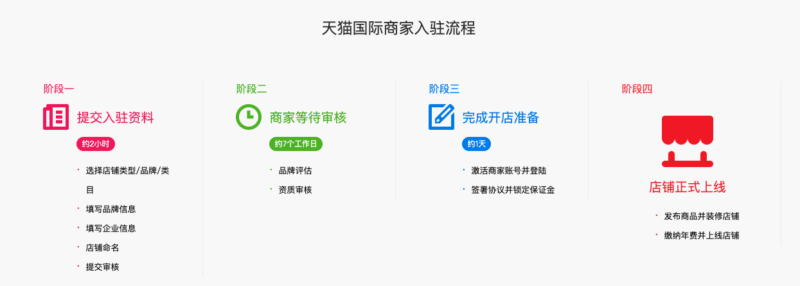
Picture source: Tmall, Tmall Global merchant registration process
- Stage One: submission and selection: This step includes the application process, where merchants choose store type, brand, category and name.
- Stage Two: review and approval process: This part takes approximately 7 working days, as merchants await the completion of the review process, which includes brand evaluation and qualification review.
- Stage Three: Final Preparations for store opening: It’s time to activate the merchant login, sign the agreement and secure the deposit.
- Stage Four: Official store launch: this step includes the publication of products with good product descriptions and customization of the store appearance.
When it comes to foreign merchants without a legal entity in China, they are eligible to open stores on Tmall Global. The annual fee for Tmall Global ranges from USD 5,000 to USD 10,000 depending on the product category. Before opening a store on Tmall Global, merchants are also required to place a security deposit ranging from USD 8,000 to USD 25,000.
Maximizing engagement and sales: a Tmall store marketing strategy
Optimizing a Tmall store involves several key practices aimed at enhancing visibility, engagement, and conversions.
Best Practices for Tmall Store Optimization and Engagement
Chinese consumers tend to go through product reviews and ratings before making a purchase. Thus, high-quality product images, detailed product descriptions, and customer reviews play a pivotal role in building trust and influencing purchase decisions. Utilizing Tmall’s promotional tools and participating in major shopping festivals can significantly increase a store’s visibility.
Marketing strategies: Social media, KOLs, and live-streaming
Social media, Key Opinion Leaders (KOLs), and live streaming are powerful channels for reaching and engaging with Chinese consumers.
- Social Media Integration: Leverage platforms like Weibo, WeChat, Xiaonghongshu, and Douyin for brand storytelling and to drive traffic.
- Collaboration with KOLs: Partner with KOLs to tap into their followers and gain credibility. KOLs can help introduce products to a wider audience through reviews, tutorials, and endorsements.
- Live Streaming: Utilize live streaming, a highly popular format in China, to showcase products, provide live demonstrations, and interact with consumers in real-time. This format offers the immediacy and interactivity that Chinese consumers value, leading to higher conversion rates.
Customer service excellence: Building brand loyalty on Tmall
Outstanding customer service is crucial for building and maintaining brand loyalty on Tmall. Responsive and helpful customer service can differentiate your brand, encourage repeat purchases, and foster positive reviews.
- 24/7 Customer Support: Implement round-the-clock customer service to assist shoppers at any time.
- Personalized Service: Offer personalized shopping advice and after-sales support to enhance the customer experience.
The integration of AI and AR in Tmall Stores for an enhanced shopping experience
The adoption of AI and AR technologies can significantly enhance the shopping experience on Tmall. AI can offer personalized product recommendations and improve search functionalities, while AR allows customers to try products virtually.
- AI-Powered Recommendations: Utilize AI to analyze customer behavior and preferences, offering personalized product suggestions.
- AR Try-Ons: Implement AR solutions for products like cosmetics and apparel, enabling customers to visualize how these products would look on them before making a purchase.
- Chatbots and AI Customer Service: Deploy AI-powered chatbots for instant customer service, capable of handling common inquiries and providing shopping assistance.
L’Oréal’s E-commerce mastery: Case study on leading Tmall
In 2023, L’Oréal was the best-performing FMCG brand on Tmall. The beauty brand’s success on Tmall, and by extension in China, can be attributed to a comprehensive strategy that leverages KOL marketing, market research, and an expansive understanding of consumer needs.
L’Oréal capitalized on the power of livestreaming and influencers to drive sales, particularly during significant shopping events like Singles Day. By partnering with stars like Austin Li and racking up 392 hours of live streaming during the 2019 Singles Day, they smashed sales records, fulfilling over 10.34 million orders. During this period, the brand also ranked first within the beauty category and became one of fifteen brands that achieved over RMB 1 billion.
In 2020, L’Oréal partnered with Tmall Little Black Box, to introduce the REVITALIFT Anti-Wrinkle Essence. Launched in March 2017, Tmall Little Black Box is Alibaba’s innovative platform that uses big data to spotlight new global products, aiming to set trends for the youth market. It’s recognized for its role in launching products and establishing bestsellers for brands. They innovated with a cloud-based “escape room” themed experience space within the L’Oréal Tmall Flagship store. The campaign included a live-streamed product launch that attracted over 220,000 viewers. Additionally, L’Oréal expanded its reach through extensive multimedia campaigns across major platforms like Weibo and Douyin, supported by collaborations with over 500 KOLs.
L’Oréal China also collaborated with Alibaba’s Tmall Innovation Centre (TMIC) in 2018. This partnership focused on developing male beauty products specifically tailored for the Chinese market, using consumer insights derived from Alibaba’s e-commerce ecosystem, ensuring the development of products with a higher chance of success and capitalizing on the growing demand for male grooming products in China.
Navigating Chinese e-commerce platform: Tmall’s potential for international brands
- Tmall is a premium online marketplace by Alibaba, focusing on established brands and authorized retailers.
- Taobao is an open marketplace for anyone, offering a vast variety of products and quality, usually from the same country. Meanwhile, Tmall offers a curated experience with established brands and authorized retailers. On the other hand, Tmall Global is designed for international brands to sell directly to Chinese consumers.
- Tmall users are mainly young females. They are also generally high spenders and willing to pay a higher price compared to Taobao customers.
- While the consumers value quality and established brands, Tmall users are still attracted to deals and discounts. The platform offers frequent sales events to satisfy bargain hunters.
- To succeed on Tmall, brands should focus on high-quality product presentations, detailed descriptions, and leveraging customer reviews to build trust. Mobile optimization is crucial, as most users access Tmall via smartphones. Additionally, employing SEO strategies, implementing interactive features, and utilizing social media marketing with KOLs and live streaming are all essential for engagement.
- L’Oréal’s success on Tmall can be attributed to their strategic use of KOLs, market research, and understanding of consumer needs. They effectively leveraged live streaming during Singles’ Day and partnered with Tmall platforms for product launches.
Research-driven strategies for e-commerce excellence on Tmall
Daxue provides expert analysis and strategy for thriving on Tmall, focusing on market trends, consumer behavior, and platform insights for business. We deliver actionable, data-backed strategies to enhance online presence and customer engagement in Tmall’s competitive space, empowering businesses to achieve lasting success. Contact us to get valuable market and consumer insights in China.



